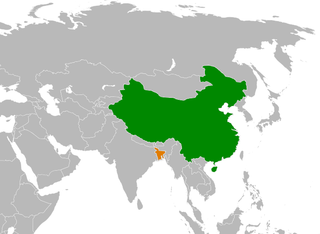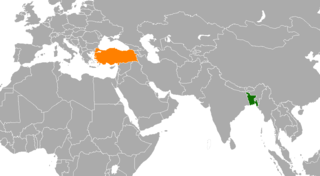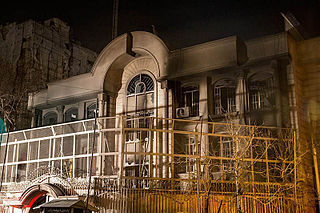Archer Kent Blood was an American career diplomat and academic. He served as the last American Consul General to Dhaka, Bangladesh. He is famous for sending the strongly worded "Blood Telegram" protesting against the atrocities committed in the Bangladesh Liberation War. He also served in Greece, Algeria, Germany, Afghanistan and ended his career as charge d'affaires of the U.S. Embassy in New Delhi, India, retiring in 1982.

In mid-June 2007, Salman Rushdie, the British Indian novelist and author of the controversial novel The Satanic Verses, was created a Knight Bachelor by Queen Elizabeth II. This action brought much controversy around the world in many countries with Muslim majority populations. Soon after the news of the knighthood was released protests against the honour were held in Malaysia and in Pakistan where effigies of the writer were publicly burnt. On 19 June 2007, governments in both Pakistan and Iran summoned their British ambassadors to officially protest against the award. While many groups and individuals have renewed the call to execute Rushdie, the author "is not commenting on the latest threats to his life. It is understood he is anxious not to inflame the situation". When asked by the Associated Press if his silence was at the request of the British government, Rushdie replied by e-mail stating "The British authorities have not asked me to do or not do anything. I have simply chosen to remain out of this storm for the moment. And nobody is turning anything down." The media noted in July 2007 that Rushdie "has not been seen in public since the 16 June announcement of his knighthood." However, he was photographed receiving his knighthood formally the next year at a ceremony which, breaking with tradition, did not announce in advance his attendance.

Pakistan and Bangladesh are both South Asian Muslim-majority countries. Following the end of the British Empire, the two countries formed a single state for 24 years. The Bangladesh Liberation War in 1971 resulted in the secession of East Pakistan as the People's Republic of Bangladesh. Pakistan recognized Bangladesh in 1974 after pressure from across the world.

Bangladesh–China relations are the bilateral relations of Bangladesh and China. Bangladesh has an embassy in Beijing and consulates in Hong Kong and Kunming. China has an embassy in Dhaka. Both countries are members of the BCIM Forum. According to Chinese government designations, Bangladesh and China are in a "strategic partnership of cooperation".

Abul Maal Abdul Muhith was a Bangladeshi economist, writer, civil servant, secretary, diplomat and politician. He served as the Finance Minister of the government of Bangladesh from January 2009 until January 2019.
Reactions to the Gaza flotilla raid on 31 May 2010 ranged from fierce condemnation to strong support for Israel.
Anti-Pakistan sentiment, also known as Pakistan-phobia, Pakophobia or Pakistanophobia, refers to hatred, fear, hostility or irrational fixation toward Pakistan, Pakistanis and Pakistani culture. The opposite is pro-Pakistan sentiment.

The International Crimes Tribunal (Bangladesh) is a domestic war crimes tribunal in Bangladesh set up in 2009 to investigate and prosecute suspects for the genocide committed in 1971 by the Pakistan Army and their local collaborators, Razakars, Al-Badr and Al-Shams during the Bangladesh Liberation War. During the 2008 general election, the Awami League (AL) pledged to try war criminals. The government set up the tribunal after the Awami League won the general election in December 2008 with a more than two-thirds majority in parliament.

The 2011 NATO attack in Pakistan was a border skirmish that occurred when United States-led NATO forces engaged Pakistani security forces at two Pakistani military checkposts along the Afghanistan–Pakistan border on 26 November 2011, with both sides later claiming that the other had fired first. Two NATO Apache helicopters, an AC-130 gunship and two F-15E Eagle fighter jets entered as little as 200 metres (660 ft) to up to 2.5 kilometres (1.6 mi) into the Pakistani border area of Salala at 2 a.m. local time. They came from across the border in Afghanistan and opened or returned fire at two Pakistani border patrol check-posts, killing 28 Pakistani soldiers and wounding 12 others. This attack resulted in a deterioration of relations between Pakistan and the United States. The Pakistani public reacted with protests all over the country and the government took measures adversely affecting the American exit strategy from Afghanistan, including the evacuation of Shamsi Airfield and closure of the NATO supply line in Pakistan.

The 2013 India–Pakistan border incidents was a series of armed skirmishes along the Line of Control (LoC) in the disputed Kashmir area. Starting from the mid-January 2013, they have been described as the "worst bout of fighting in the region in nearly 10 years". It began on 6 January 2013, when according to Pakistani reports Indian forces attacked a Pakistani border post, killing one soldier. Indian authorities claimed the incident as a retaliation against preceding Pakistani ceasefire violations, but denied having crossed the demarcation line. In a second skirmish on 8 January, Indian authorities said that Pakistani forces crossed the LoC, killing two Indian soldiers. The incident sparked outrage in India and harsh reactions by the Indian army and government over the news that the body of one of the soldiers had been beheaded. Pakistan denied these reports. On 15 January, a third skirmish reportedly led to the death of another Pakistani soldier.
Abdul Quader Molla was a Bangladeshi Islamist leader, writer, and politician of the Bangladesh Jamaat-e-Islami, who was convicted of war crimes and sentenced to death by the International Crimes Tribunal, Bangladesh (ICT) set up by the government of Bangladesh and hanged. There were objections from the United Nations, the governments of several countries, including Turkey, and international human rights organizations but on the other hand there was widespread support from the general public of Bangladesh for the execution.

On 5 February 2013, protests began in Shahbag, Bangladesh, following demands for the execution of Abdul Quader Mollah, who had been sentenced to life imprisonment and convicted on five of six counts of war crimes by the International Crimes Tribunal of Bangladesh. Later demands included banning the Bangladesh Jamaat-e-Islami party from politics including election and a boycott of institutions supporting the party.
The 2003 attack on the Pakistan Embassy in Kabul occurred when up to 500 Afghan protesters overran the embassy of Pakistan on 9 July 2003. It was the second major attack since 1995, when the embassy was also assaulted by Afghan protesters.

Bangladesh–Turkey relations refers to the bilateral relations between Bangladesh and Turkey. Both countries are members of the Organisation of Islamic Cooperation. Turkey has an embassy in Dhaka and Bangladesh has an embassy in Ankara and a consulate in Istanbul.

The 2016 attack on the Saudi diplomatic missions in Iran was a mob action on 2 January 2016 by protesters against the execution of a prominent Saudi Arabian Shi'a cleric. Mobs stormed the embassy in Tehran and the Saudi consulate in Mashhad and ransacked them. The embassy building was set on fire with Molotov cocktails and petrol bombs. During the attacks, the police arrived and dispersed protesters from the embassy premises and extinguished the fire.

The High Commission of the Islamic Republic of Pakistan in New Delhi is the diplomatic mission of Pakistan in India. Between 1972 and 1989, the mission was known as the Embassy of Pakistan in New Delhi, as Pakistan was then temporarily a republic outside the Commonwealth of Nations, an intergovernmental organization primarily comprising former territories of the British Empire.
Afrasiab Mehdi Hashmi is a Pakistani diplomat and author. He served as Pakistan's High Commissioner to Bangladesh from 2011 to 2014, and as High Commissioner to New Zealand from 2016 to 2017.

The High Commission of Bangladesh in Islamabad is the chief diplomatic mission of Bangladesh in Pakistan. It is located in Sector F-6 of Islamabad. The present Bangladeshi High Commissioner to Pakistan is Md. Ruhul Alam Siddique, who assumed diplomatic duties in October 2020. Bangladesh also has a Deputy High Commission in Karachi, and an honorary consul in Lahore.

The Deputy High Commission of Bangladesh in Karachi is a diplomatic mission of Bangladesh in Pakistan. It is located in Phase VI of the Defence Housing Authority in Karachi. The presently designated Deputy High Commissioner is S. M. Mahbubul Alam, who was appointed in 2021. The Deputy High Commission reports to the High Commission of Bangladesh in Islamabad.
Suhrab Hossain is a Bangladeshi diplomat and former ambassador. He severed as the High Commissioner of Bangladesh to Canada and Pakistan.











